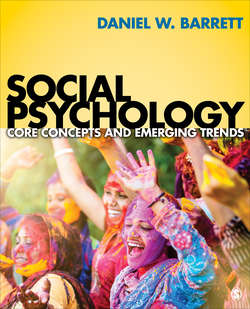Читать книгу Social Psychology - Daniel W. Barrett - Страница 54
На сайте Литреса книга снята с продажи.
Hindsight Bias
ОглавлениеOne common mistake that you need to be aware of—and avoid—is that, if a social psychological explanation seems obvious, you may be tempted to think “I knew it all along.” This “knew it all along” tendency is called the hindsight bias, and it is demonstrated when people believe, after they have already learned the outcome of a particular event, that they would have correctly predicted it had they been given the chance (Arkes, 2013; Fischhoff, 1975; Roese & Vohs, 2012; Slovic & Fischhoff, 1977). Let’s say that social psychologists found that people who have very low self-esteem are more aggressive than people who have very high self-esteem. Does this seem obvious? Well, if you said yes, then you would be incorrect. Very high, not very low, self-esteem is associated with more aggression (Bushman & Baumeister, 1998; Bushman et al., 2009). As you will see, social psychology usually isn’t obvious, but when it seems to be don’t assume that you already knew it.
It is worth noting that this hindsight bias is not one of these “obvious” findings. Let me explain. Fischhoff (1975) provided randomly assigned experimental participants with one of several possible outcomes of an historical event, such as who won a military battle. He asked them to estimate the likelihood that the outcome that they read had occurred. Participants were informed that the event and the outcome they read about had in fact happened. Other participants who were not told the outcome read the same passage but were presented with four possible outcomes and predicted how likely each outcome was. Participants who knew the actual outcome rated the likelihood of that outcome as much greater than did participants who did not know the outcome (see Figure 1.5). In other words, participants believed that they were more likely to have predicted the correct outcome than they actually were. They thought they knew it all along (Adapted from Fischhoff, B., 1975).
Figure 1.5 Hindsight Bias: Did You Really “Know It All Along”?
Source: Adapted from Fischhoff, B. (1975). Hindsight is not equal to foresight: The effect of outcome knowledge on judgment under uncertainty. Journal of Experimental Psychology: Human Perception and Performance, 1(3), 288–299.
The general idea is that people often believe that they could have accurately predicted the occurrence of an actual event if they had been asked to predict it before it occurred: The outcome is seen as obvious or inevitable (Hoffrage, Hertwig, & Gigerenzer, 2011). Similarly, students often (erroneously) believe that they already knew the results of a given social psychological study and could have correctly predicted it. However, they fail to realize that their knowledge of the actual outcome has biased their belief that they would have known the outcome before being told. In short, once we know the answer, it suddenly seems obvious! The hindsight bias may lead you to study less than you should because you “knew it all” ahead of time: Don’t wait until your first disappointing test to find out that you didn’t. Many a student has come to me after receiving a low grade on an exam with a distraught look muttering something like “I thought I understood everything—it all seemed so straightforward.” So watch out and study well!
Lay Theory: Explanation for social behavior that is possessed by an ordinary (lay) person without advanced training in psychology and without using scientific methods
Hindsight Bias: Incorrect belief that, after a person has already learned the outcome of a particular event, he or she would have accurately predicted the outcome before it occurred
